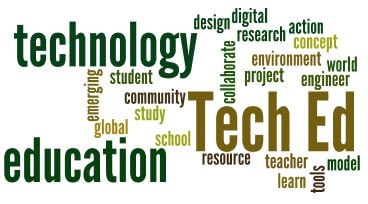Maximize Your Earnings Potential with Proven Make Money Techniques
Comprehensive Organization Guides for Advancing Technology Education in Schools and Colleges
The combination of modern technology education right into institution and college educational program has actually come to be a critical necessary in preparing trainees for an increasingly electronic workforce. What specific techniques can be adopted to optimize their impact on both trainees and instructors?
Value of Technology Education
As modern technology remains to develop at an unprecedented rate, the significance of technology education and learning has come to be progressively apparent in today's society. The integration of modern technology into numerous elements of life requires that people possess a fundamental understanding of technical ideas and applications. This understanding not just enhances employability however also promotes vital thinking and analytical abilities important for browsing a dynamic labor force.
In schools, technology education outfits trainees with the ability to adapt to quick adjustments in sectors driven by advancement. It urges creative thinking and empowers learners to involve with arising modern technologies, from expert system to data analytics. Technology education and learning advertises digital literacy, which is critical in a period where info is conveniently offered yet frequently misleading.

Trick Elements of Effective Guides
Reliable guides for technology education and learning have to encompass numerous crucial parts to ensure that learners acquire the most from their experiences. First, a well-defined educational program is essential, describing the goals, discovering results, and the abilities to be created. This curriculum must be routinely updated to reflect the rapidly evolving technological landscape, ensuring relevance and applicability.
2nd, comprehensive sources that consist of textbooks, online materials, and hands-on tools are vital. These sources should be varied and obtainable, dealing with different finding out designs and preferences. In addition, incorporating real-world circumstances and study can enhance understanding and involvement.
Third, evaluation methods have to be consisted of to assess learner progression properly. These assessments need to be differed, encompassing cumulative and developmental evaluations that straighten with the learning objectives.
Additionally, professional growth chances for educators are critical. Educating programs and workshops can equip instructors with the most recent pedagogical methods and technical improvements.
Last but not least, promoting a collaborative understanding atmosphere urges peer interaction and understanding sharing. By consisting of these key components, guides for innovation education and learning can considerably improve the understanding experience, preparing students for future difficulties in a significantly digital world.
Building Market Partnerships
Structure solid sector collaborations is a vital aspect of enhancing technology education. These partnerships in between schools and services produce a vibrant ecological community that profits pupils, educators, and employers alike. By cultivating partnerships with market leaders, institutions and universities can align their curricula with the evolving needs of the work market, making sure that pupils get pertinent skills and knowledge.
The development of teaching fellowships, instructions, and mentorship programs works as a foundation of these partnerships. Such opportunities give pupils with hands-on experience, enhancing their employability and useful understanding of technology applications. In addition, market partners can supply understandings right into emerging fads and technical developments, allowing instructors to adjust their mentor approaches appropriately.
Furthermore, collaborations can facilitate accessibility to sources, such as equipment, software program, and funding for study projects. These payments enhance the learning atmosphere and enable organizations to stay at the forefront of technical innovation. Inevitably, building durable industry collaborations is vital for growing a knowledgeable workforce that fulfills the requirements these days's rapidly transforming technological landscape, while likewise driving financial development and competitiveness in the wider community.
Implementing Innovation Programs
Applying technology programs within universities requires a tactical technique that focuses on both curriculum growth his explanation and resource allotment. To launch effective technology combination, institutions need to first examine their existing framework and identify gaps in sources, consisting of equipment, software, and personnel training. This evaluation makes it possible for universities and colleges to develop a customized plan that straightens with their certain educational objectives.
Next, it is necessary to develop a detailed educational program that includes arising modern technologies and market criteria. Working together with instructors, industry experts, and stakeholders can ensure that the curriculum remains effective and relevant in preparing pupils for the labor force (Grants). Furthermore, specialist advancement for faculty is vital, as it outfits educators with the skills necessary to effectively teach brand-new technologies
Moreover, organizations ought to highlight the relevance of hands-on learning experiences, such as labs and workshops, that permit students to apply academic understanding in useful Homepage setups. This experiential strategy improves interaction and cultivates essential reasoning. Lastly, securing lasting funding with collaborations and grants can aid broaden and maintain modern technology programs, guaranteeing long-term success and versatility in an ever-evolving technical landscape.
Measuring Success and Results
Examining the success and outcomes of modern technology education programs is crucial for validating their effect and assisting future improvements. Efficient dimension frameworks must encompass both quantitative and qualitative metrics, offering a thorough view of program effectiveness. Secret efficiency indicators (KPIs) such as trainee registration numbers, retention rates, and course conclusion portions supply beneficial measurable data.

Incorporating standardized analyses can even more review trainees' technological competencies and preparedness for the workforce. Benchmarking against comparable institutions permits contextually appropriate comparisons, highlighting areas for development.
Ultimately, the constant evaluation of innovation education programs promotes a society of renovation, ensuring that they develop abreast with market demands and academic criteria. By systematically gauging success, establishments can not only demonstrate liability to stakeholders but also improve their offerings, consequently enriching the discovering experience and preparing pupils for the ever-changing technical landscape.
Conclusion

The integration of technology education right into institution and university curricula has become an essential essential in preparing students for a progressively digital workforce.As innovation continues to progress at an extraordinary rate, the relevance of modern technology education and learning has actually become increasingly evident in today's society.In educational establishments, innovation education gears up trainees with the ability to adapt to rapid changes in markets driven go now by advancement. By prioritizing innovation education, institutions can grow a generation of educated citizens qualified of leveraging technology for societal and personal improvement. The application of robust assessment approaches allows organizations to measure success and outcomes, inevitably improving the overall performance of technology education and learning campaigns and preparing trainees for future challenges.